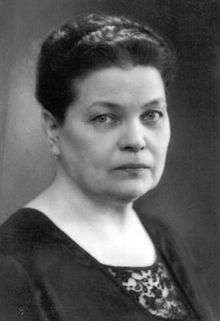Maria Jotuni
Maria Gustaava Jotuni (Haggrén until 1906,[1] Jotuni-Tarkiainen from 1911, born 9 April 1880[1] Kuopio, died 30 September 1943 in Helsinki) was a Finnish author and a playwright.
Maria Jotuni | |
|---|---|
 Maria Jotuni in 1930 | |
| Born | Maria Gustaava Jotuni 9 April 1880 Kuopio, Finland |
| Died | 30 September 1943 (aged 63) Helsinki, Finland |
Life
Jotuni went to an all-girls school in Kuopio.[2] She graduated in 1900 and planned to become teacher. In 1900–1904 she studied history and literature at the University of Helsinki.[2] Jotuni met her future husband, the literary critic Viljo Tarkiainen (1879–1951), in the university, and they got married in 1911. They had two sons: Jukka Tarkiainen and Tuttu Tarkiainen.
She is sometimes considered an early feminist,[3] and according to Jukka's son Kari Tarkiainen, her posthumously published novel Huojuva talo ("Tottering House") was based on her marriage to his grandfather; it depicts the husband as nightmarishly abusive.
She started working as a journalist in a student magazine at the University of Helsinki. Maria Haggrén changed her surname to Jotuni in 1906. "Jotuni" means a giant in Scandinavian mythology.[2][4][5] She died of heart disease in Helsinki.[1]
Works
| Library resources about Maria Jotuni |
| By Maria Jotuni |
|---|
Plays:
- Vanha koti (1910: "The Old Home")
- Miehen kylkiluu (1914: "The Man's Rib")
- Savu-uhri (1915: "Smoke Sacrifice")
- Kultainen vasikka (1918: "The Golden Calf")
- Tohvelisankarin rouva (1924: "The Hen-Pecked Husband's Wife")
- Olen syyllinen (1929: "I am Guilty")
- Kurdin prinssi (1932: "The Kurd Prince")
- Klaus, Louhikon herra (1942: "Klaus, Master of Louhikko")
Novels:
- Arkielämää (1909: "Ordinary Life")
- Huojuva talo (1936, published 1963 posthumously. Depicts contemporary literary ideas, realism and Tolstoyism. Adapted for the Finnish stage by Maaria Koskiluoma in 1983; Koskiluoma's stage adaptation was translated into English as Tottering House by Douglas Robinson for the Frank Theatre in Minneapolis in 1994.)
- Äiti ja poika. Elämän hiljaisina hetkinä (1965: "Mother and Son: In Life's Quiet Moments")
- Norsunluinen laulu (1947, posthumous: "Ivory Song")
- Jäähyväiset (1949, posthumous: "Farewell").
Short stories:
- Suhteita (1905: "Relationships")
- Rakkautta (1907: "Love")
- Kun on tunteet (1913: "Since There Are Feelings")
- Martinin rikos (1914: "Martin's Crime")
- Jussi ja Lassi (1921: "Jussi and Lassi")
- Tyttö ruusutarhassa (1927: "The Girl in the Rose Garden")
Collection of other works:
- Kootut teokset I–IV (1930: "Collected Works I-IV")
- Valitut teokset (1954: "Selected Works")
- Maria Jotunin aforismit (1959: "MJ's Aphorisms")
- Novellit ja muuta proosaa I–II (edited by Irmeli Niemi, Otava, 1980: "Short Stories and Other Prose, I-II")
- Näytelmät (edited by Irmeli Niemi. Otava, 1981: "Plays")
- Kun on tunteet, Tyttö ruusutarhassa ynnä muita novelleja edited by Irmeli Niemi, SKS, 1999, 262 pages, ISBN 951-746-125-9 ("Since There Are Feelings, The Girl in the Rose Garden, and Other Short Stories")
Sources
- Maria Jotuni 1880 – 1943. dr.dk
- Liukkonen, Petri. "Maria Jotuni". Books and Writers (kirjasto.sci.fi). Finland: Kuusankoski Public Library. Archived from the original on 6 July 2009.
- Continuum Companion to Twentieth Century Theatre, edited by Colin Chambers, p. 277
- Maria Jotuni. koulut.kuopio.fi
- Innostus Archived 20 July 2011 at the Wayback Machine. tuhannettunteet.kuopio.fi (in Finnish)
External links
| Wikimedia Commons has media related to Maria Jotuni. |
- http://home.c2i.net/amd/finwomen/jotuni.htm Another page about Jotuni
- https://web.archive.org/web/20090105192942/http://www.teatteri.org/theatre/nevala.htm Finnish theatre site about Jotuni
- Maria Jotuni in 375 humanists 21.1.2015, Faculty of Arts, University of Helsinki